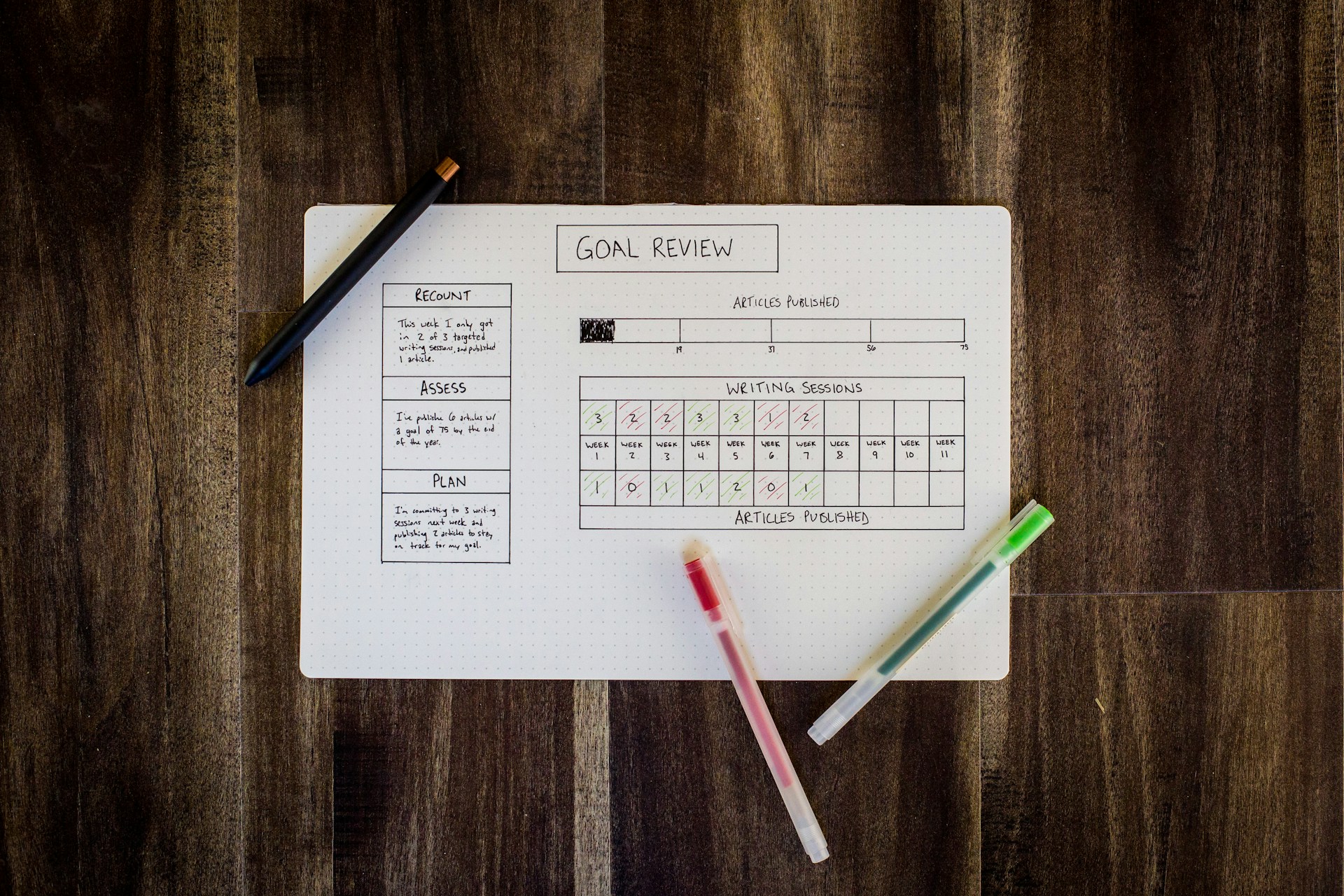Прочети на Български ==> Read in English (US)
One of the most important aspects of remote work is to set freelancing goals to ensure you are getting things done and on the path to success.
Whether you want to break through in the freelance world or grow further, this list will provide insights on what you can improve.
Here's a list of 161 work goals divided into several categories:
Long-Term Goals
1. Achieve financial independence.
2. Reach a variety of clients to sell your services to.
3. Create your unique personal brand.
4. Expand your professional network.
5. Develop expertise on a particular topic.
6. Invent a business activity that clients will adore.
7. Set a desired income per year and achieve it.
8. Get certified for the skills you possess.
9. Create passive income streams.
10. Establish work-life balance boundaries.
11. Build a team and give tasks to your workers.
12. Become one of the thought leaders in your industry.
13. Secure ongoing retainer contracts.
14. Establish multiple income streams.
15. A Self-set objective can be reaching a particular number of followers or subscribers on various social media platforms.
16. Develop proficiency in a new skill or productivity tool.
17. Grow your reputation online.
18. Develop communication and negotiation skills.
19. Make more productive time management and waste less time.
20. Come up with an elaborate retirement savings plan.
21. Build up a solid customer strategy plan.
22. Make clients happy and achieve success in building relationships.
23. Grab awards or recognition from your career field.
24. Expand to international markets.
25. Increase your freelance rates.
26. Start the creation of a product or a new product line.
27. Create collaborative relationships with your fellow freelancers and other businesses.
28. Enhance your project management skills.
29. Maintain a clear work routine and stick to set deadlines.
30. Write a book and make an e-book version for online distribution.
31. Create a detailed marketing plan for your services.
32. Improve your customer service skills.
33. Create valuable content consistently.
34. Expand your technical skillset and develop the most important knowledge for your industry.
35. Achieve a certain number of referral sign-ups a month.
36. Attend events, conferences, or exhibitions from your field.
37. Establish a dedicated workspace.
38. Develop a deliberate plan devoted to your personal development.
39. Acquire clients' reviews and stories of their satisfaction with your services.
40. Put effort and resources into creating and perfecting your personal branding and marketing materials.
41. Work on developing a strong portfolio that highlights your work.
42. Get more website traffic and engagement rate.
43. Improve project delivery timelines.
44. Enhance your problem-solving skills.
45. Establish a mechanism for monitoring finance and each expense for your freelance career.
46. Expand your customer base among various sectors.
47. Participate in mentorship programs.
48. Aim for a competitive advantage by crafting a unique selling proposition (USP).
49. Add additional services for your clients.
50. Achieve a great work-life balance.
Short-Term Goals
51. Win projects on bidding platforms by providing services with higher standards than your competitors.
52. Divide your working time into short sessions with 5-10 minute breaks in between.
53. Create an efficient and organized workspace.
54. Carry out research and target possible customers.
55. Make revisions and update your resume and portfolio with your most recent achievements.
56. Go ahead and sign up for webinars on topics you are interested in.
57. Reduce time spent in answering clients' queries.
58. Create ready-made templates for the usually performed tasks or communication.
59. Create a marketing plan for a newly launched service.
60. Boost your engagement on social media.
61. Automate your invoices by integrating relevant payment systems and billing.
62. Streamline project management processes.
63. Acquire technical skills to help you work with software tools as an advanced user.
64. Send invitations to previous customers to provide you with feedback.
65. Specialize in advancing your writing techniques in project proposals, policy development, and communication.
66. Maintain good rules or conditions for the clients and peers.
67. Learn how to research and apply for awards in an industry of interest.
68. Design a content calendar covering blogs or posts on your social media accounts.
69. Remove time-wasting activities from your day.
70. Structure a pricing approach for the services you offer.
71. Make time to join events for networking.
72. Foster industry knowledge especially concerning the latest trends and updates.
73. Improve based on clients' feedback and regularly reach out for more.
74. Set a percentage increase for growing your email subscribers.
75. Create a list of leads and track the prospecting process.
76. SEO of your website or your online profiles is worth improving.
77. Strategies for applying a healthy work-life balance implementation.
78. Develop an expense and income chart.
79. Change out branding elements like logo or website design.
80. Engage in platforms researching and apply to speak on panels and events.
81. Enhance client onboarding for quick and easy transitions.
82. Determine and revise the pricing strategy for your services.
83. Provide something extra, for example, tools to help your audience with a topic they might be struggling with.
84. Update your LinkedIn profile with new recent achievements.
85. Introduce a daily/weekly review process of executed tasks.
86. Research and join platforms with more job postings.
87. Develop an outline of an e-book or course which you will write or create.
88. Look for partnership opportunities with relevant companies for mutual projects.
89. Improve your overall accuracy.
90. Manage the seasonal fluctuations in work.
91. Develop skills for a specific software or tool.
92. Have weekly blocks of time allotted for all self-development activities.
93. Develop a method for organizing your digital storage.
94. Assess and monitor the effectiveness and the overall impact of your current marketing channels.
95. Develop a cross-selling & upselling services marketing plan.
96. Find a way to give your clients updates regularly.
97. Take part in groups or forums focusing on your work area.
98. Create backups for your files and data.
99. Work on developing a method to cope with most distractions.
100. Set a quarterly revenue target to see whether your digital marketing efforts yield suitable results.
Daily and Weekly Goals
101. List the daily or weekly tasks to be completed and work on them.
102. Include the progress of ongoing projects.
103. Set a specific time aside to get to your workflow without any interruptions.
104. Let customers know that you will answer their emails in 24 hours.
105. Provide the project management tool with up-to-date information.
106. Work a certain amount of billable hours.
107. Take short breaks to help you relax.
108. Get in touch with potential leads and prospects.
109. Read the industry news and trends.
110. Participate in remote networking events or seminars.
111. Create social media campaigns.
112. Visualize future projects or topics.
113. A clean and organized inbox is a must.
114. Reach out to customers for referrals.
115. Feature your most recent creation on your website or portfolio.
116. Learn a new skill with the help of tutorials or online courses.
117. Include physical exercise in your weekly schedule.
118. Regularly review and adjust project timelines if necessary.
119. Send out invoices for completed work.
120. Communicate with other freelancers and discuss mutually beneficial collaborations.
121. Plan your meals to include healthy dishes for the day and the current week.
122. Find some time to pay attention to your inner world or practice mindfulness.
123. Develop a distinct plan for user engagement on social media.
124. Research and find out which partners would be interested and suitable for collaboration.
125. Update your social media profiles to reflect recent milestones.
126. Participate in virtual events or meetups, and take time to connect with others.
127. Check and revise marketing tactics based on their performance.
128. Check and amend client agreements, contracts, etc.
129. Try different productivity tools and experiment with them.
130. Put effort into continued learning and use the acquired skills in practice.
131. Take part in online forums or groups.
132. Audit and update your financial records.
133. Take time to plan your content for your blog or social media.
134. Prioritize your tasks by importance and the supposed completion deadlines.
135. Identify the set of objectives that you wish to fulfill in networking and relationship building.
136. Sort out and organize your physical home office.
137. Consider how to upgrade and enhance your website.
138. Review the achieved goals and the obstacles encountered during the day or week.
139. Dig more and look for speaking opportunities.
140. Identify concrete goals for increased client acquisition or lead generation.
141. Review your marketing materials and make the necessary adjustments.
142. Set up periods for personal needs where you can spend some time for leisure or favorite activities.
143. Prepare your favorite meal to give you the motivation to work harder.
144. Contact mentors or consultants who can give you advice.
145. Impose limits to your work schedule and online availability.
146. Read and answer feedback from clients.
147. Review the satisfaction surveys from past and present clients.
148. Plan and post your messages on social media.
149. Identify positive experiences and missed opportunities.
150. Include time for self-care and recharge.
151. Set specific revenue-focused goals.
Miscellaneous Goals
152. Check whether specific software or tools boost your productivity.
153. Familiarize with and incorporate effective methods for quality sleep.
154. Review and update the privacy as well as security settings for your profiles.
155. Research new marketing channels and explore them further.
156. Designate a place in your home, where you can go when working on your computer.
157. Make sure your home office is furnished with a comfortable chair that supports your back and position.
158. Find funding opportunities for your ideas.
159. Use and experiment with creative ways to perform your tasks.
160. Take time to plan or book longer vacations and holidays.
161. Participate in volunteer activities or provide pro bono services.
To Summarize
These points reflect how you can approach challenges in your work by setting them as goals and then working towards resolving issues.
Without goals, it's a struggle to focus and beat distractions as they arise. Freelancing goals help you choose your priorities wiser, and move toward your desired destination.
Grab our free hand-picked
list of remote jobs now!
*Includes 148 websites with multiple remote
job offers organized into 7 categories.
Bonus: You'll receive updates on new free resources as soon as they are live.
+ Best remote job recommendations and little-known freelancing hacks for time-saving.




Comments
Post a Comment